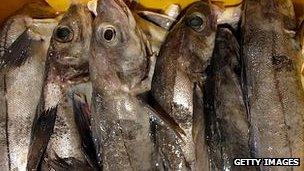Key EU fishing reform deal clinched
- Published

Massive overfishing has depleted stocks in European waters
Campaigners have welcomed an EU decision that looks likely to preserve fish stocks and support the owners of small fishing boats in coastal ports.
They say the fisheries deal , externalbetween ministers and the European Parliament is good for fish and fishermen.
It is the latest step in marathon negotiations to reform the controversial Common Fisheries Policy.
Fishing groups are urging politicians to ensure that the reformed CFP rules allow them to stay in business.
The decision is a compromise between the European Parliament, which wants radical reform, and the Council, where member states led by Spain and France are trying to protect industrial fishing.
The final wording of the package has not yet been agreed and the full parliament plans to hold a vote on it in June or July.
Campaigners say the result is largely a victory for reform. It will allow nations to reallocate fish quotas from large operators to small, in a drive to reduce the damage caused by overfishing.
Simon Clydesdale from the environmental group Greenpeace said that “for decades in Europe fishing has been a story of decline, with severe over-exploitation of fish stocks and small-scale fishermen squeezed out of business by a minority of fishing barons.
“For all its loopholes and sluggish timelines the policy agreed last night has the potential to turn Europe’s destructive and oversized fishing industry into a sustainable, low-impact sector.”
Crackdown on discards
Another key decision consolidated the broad principle that Europe’s fish quotas should be set at a level where stocks can actually recover, instead of just stabilising. This was said by the Council to be a breakthrough, although Tony Long of the campaign group WWF complained: “The majority of Europe’s governments decided to stonewall negotiations.”
The meeting confirmed a previous decision to phase out the policy of discarding fish – starting with mackerel and other pelagic species by 2015. Pelagic fish live in the upper layers of the oceans. All fish will be covered by the policy by 2020. Again, there is something of a loophole as a small percentage of fish discards will continue until then.
The next phase is for fisheries to start working on detailed multi-annual plans to ensure that stocks are managed prudently. These should take the place of the annual December Fisheries Council meetings that have led to ministers bidding against each other to raise the quota for domestic fleets.
The UK environment department Defra has welcomed a move to allow regional fisheries to escape micro-management from Brussels.
Fisheries Minister Richard Benyon said the UK "has pressed hard for many years to reform this broken policy so we can fish more sustainably, ban discards and end the one-size-fits-all approach to decision-making.
"It is great news that we are almost there. We hope that we can agree the final deal very soon," he said.
An industry body, the Scottish Fishermen’s Federation, is urging the rule-makers to take practical steps to help fishing fleets. Its chief executive Bertie Armstrong said: “Fishing provides a crucial renewable food resource, so it’s vital that measures to protect our fishermen are at the heart of the CFP.”
Meanwhile the British celebrity chef and Fish Fight campaigner, Hugh Fearnley-Whittingstall, said the CFP reform "doesn't mean the Fish Fight is over, but this is a tremendous achievement which I really believe would not have happened without the help and support of all 860,000 of our Fish Fight supporters".
"The great news is that it will hugely reduce discards across Europe," he said.
Follow Roger on Twitter, external @rharrabin
- Published27 February 2013
- Published25 February 2013
- Published18 June 2012